Case Study and Verbatim Analysis: Counseling Session - Psychology
VerifiedAdded on 2020/05/04
|16
|6433
|154
Case Study
AI Summary
This assignment presents a case study and verbatim analysis of a counseling session conducted with a client from Fiji, who is pursuing a master's degree in counseling in New Zealand. The student counselor utilized a motivational interviewing style, focusing on client-centric techniques and adhering to the principles of empathy, exploring discrepancies, avoiding arguments, adjusting to resistance, and supporting optimism. The case study explores the client's background, including cultural differences and experiences with loss, which have influenced his decision to pursue counseling. The verbatim analysis provides a detailed look at the interaction between the client and the counselor, highlighting the client's concerns about acceptance, self-esteem, and cultural identity, and the counselor's responses and techniques. The analysis also touches upon the use of cognitive therapy and the impact of cultural background on the counseling process.
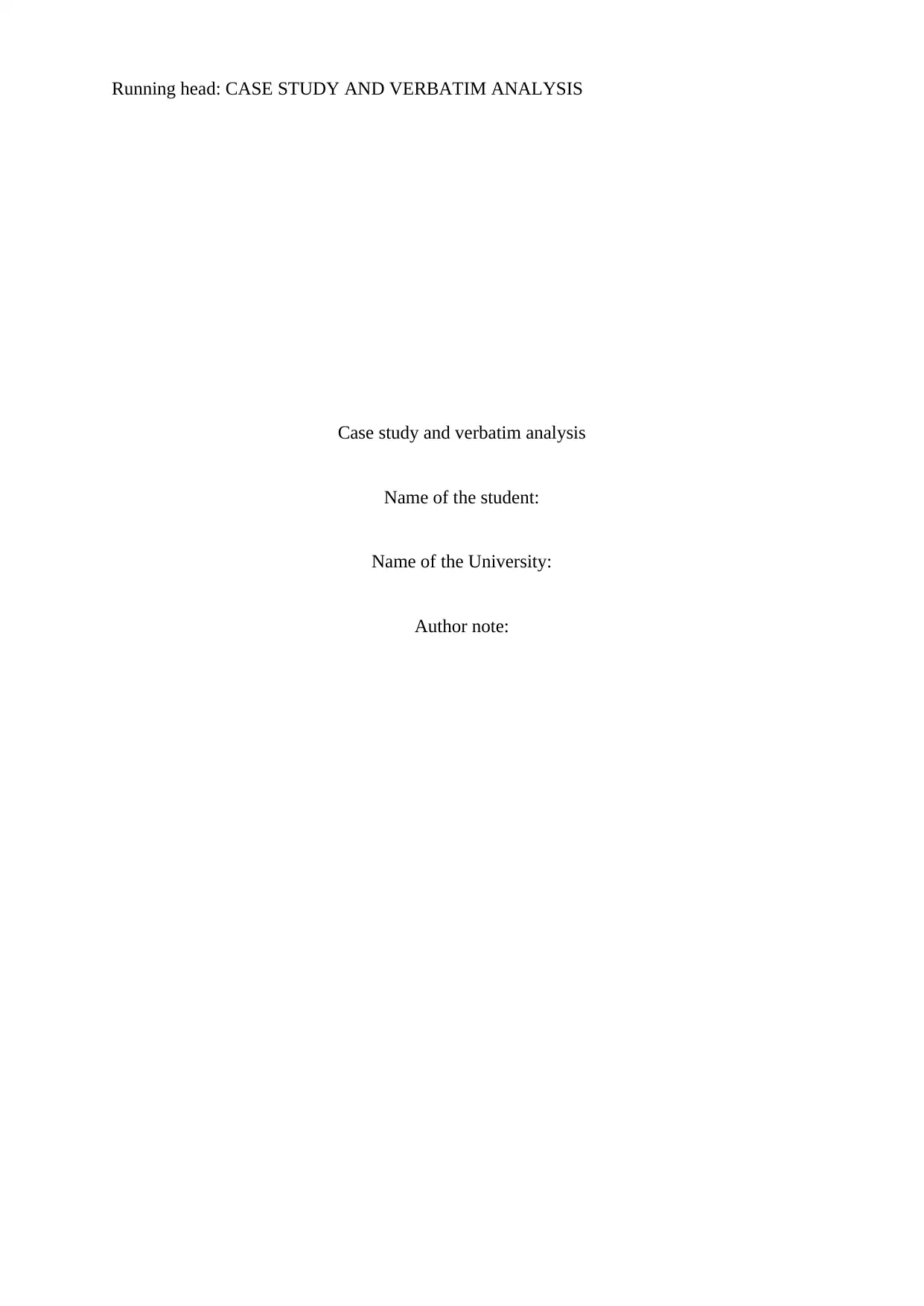
Running head: CASE STUDY AND VERBATIM ANALYSIS
Case study and verbatim analysis
Name of the student:
Name of the University:
Author note:
Case study and verbatim analysis
Name of the student:
Name of the University:
Author note:
Paraphrase This Document
Need a fresh take? Get an instant paraphrase of this document with our AI Paraphraser
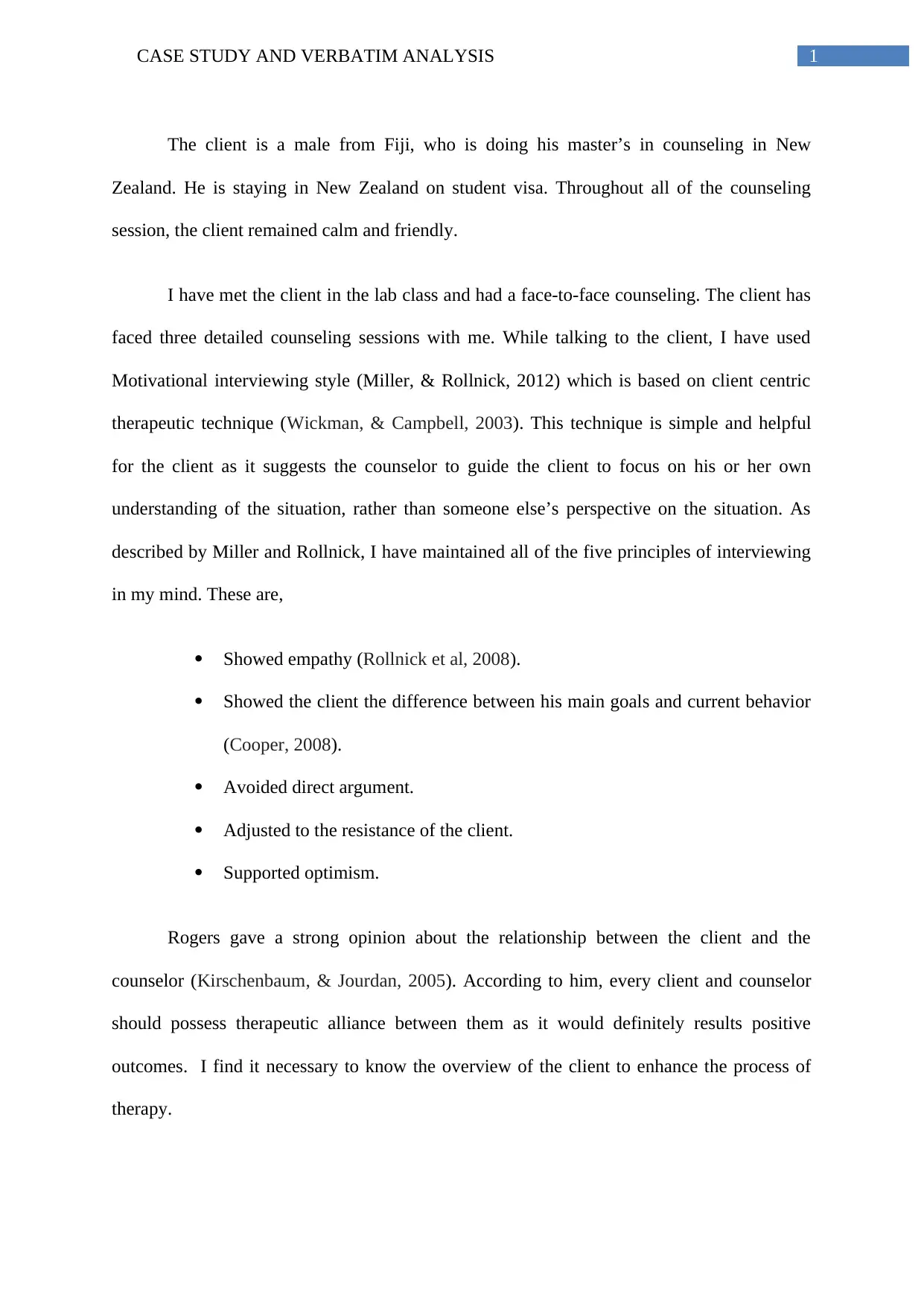
1CASE STUDY AND VERBATIM ANALYSIS
The client is a male from Fiji, who is doing his master’s in counseling in New
Zealand. He is staying in New Zealand on student visa. Throughout all of the counseling
session, the client remained calm and friendly.
I have met the client in the lab class and had a face-to-face counseling. The client has
faced three detailed counseling sessions with me. While talking to the client, I have used
Motivational interviewing style (Miller, & Rollnick, 2012) which is based on client centric
therapeutic technique (Wickman, & Campbell, 2003). This technique is simple and helpful
for the client as it suggests the counselor to guide the client to focus on his or her own
understanding of the situation, rather than someone else’s perspective on the situation. As
described by Miller and Rollnick, I have maintained all of the five principles of interviewing
in my mind. These are,
Showed empathy (Rollnick et al, 2008).
Showed the client the difference between his main goals and current behavior
(Cooper, 2008).
Avoided direct argument.
Adjusted to the resistance of the client.
Supported optimism.
Rogers gave a strong opinion about the relationship between the client and the
counselor (Kirschenbaum, & Jourdan, 2005). According to him, every client and counselor
should possess therapeutic alliance between them as it would definitely results positive
outcomes. I find it necessary to know the overview of the client to enhance the process of
therapy.
The client is a male from Fiji, who is doing his master’s in counseling in New
Zealand. He is staying in New Zealand on student visa. Throughout all of the counseling
session, the client remained calm and friendly.
I have met the client in the lab class and had a face-to-face counseling. The client has
faced three detailed counseling sessions with me. While talking to the client, I have used
Motivational interviewing style (Miller, & Rollnick, 2012) which is based on client centric
therapeutic technique (Wickman, & Campbell, 2003). This technique is simple and helpful
for the client as it suggests the counselor to guide the client to focus on his or her own
understanding of the situation, rather than someone else’s perspective on the situation. As
described by Miller and Rollnick, I have maintained all of the five principles of interviewing
in my mind. These are,
Showed empathy (Rollnick et al, 2008).
Showed the client the difference between his main goals and current behavior
(Cooper, 2008).
Avoided direct argument.
Adjusted to the resistance of the client.
Supported optimism.
Rogers gave a strong opinion about the relationship between the client and the
counselor (Kirschenbaum, & Jourdan, 2005). According to him, every client and counselor
should possess therapeutic alliance between them as it would definitely results positive
outcomes. I find it necessary to know the overview of the client to enhance the process of
therapy.
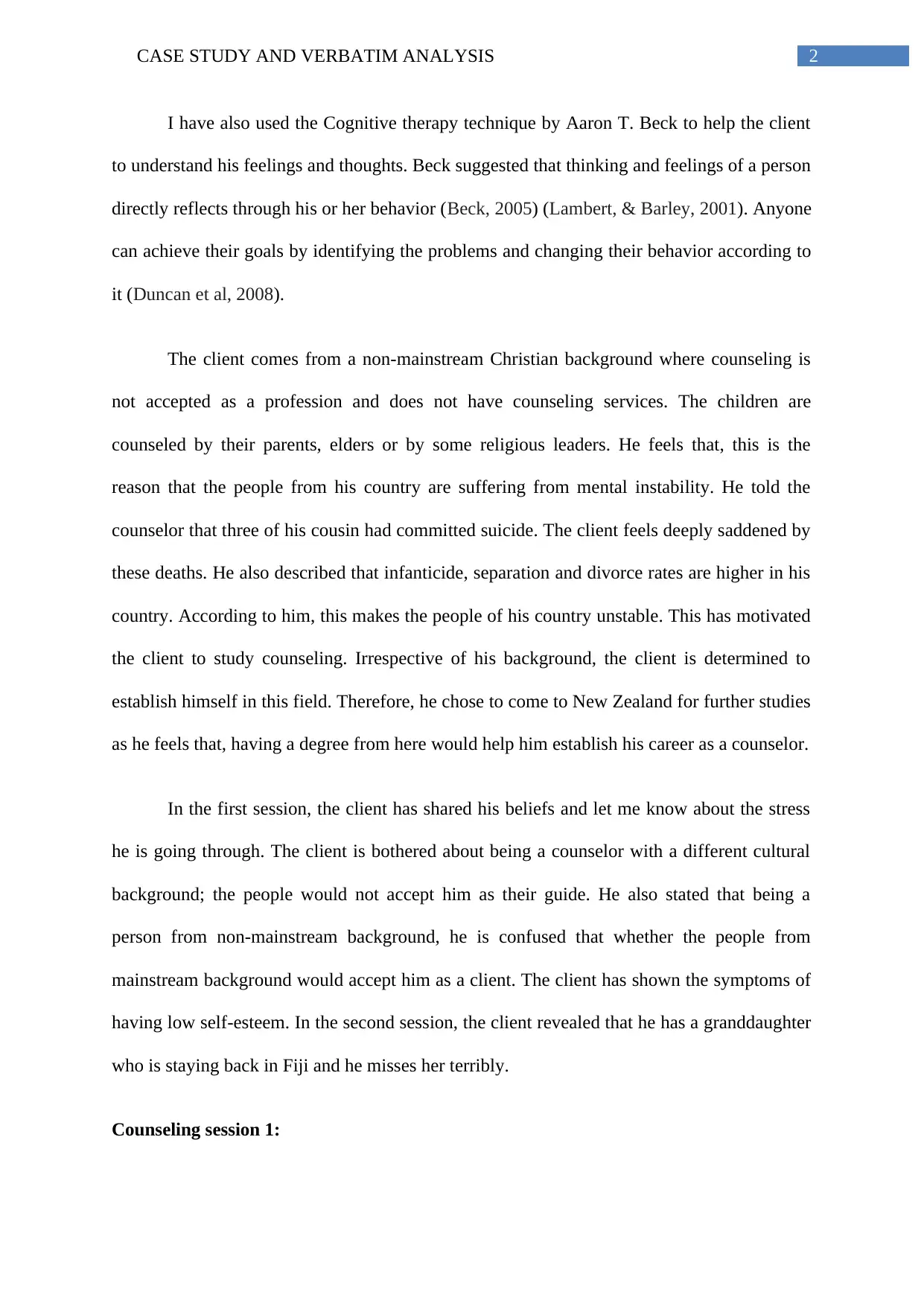
2CASE STUDY AND VERBATIM ANALYSIS
I have also used the Cognitive therapy technique by Aaron T. Beck to help the client
to understand his feelings and thoughts. Beck suggested that thinking and feelings of a person
directly reflects through his or her behavior (Beck, 2005) (Lambert, & Barley, 2001). Anyone
can achieve their goals by identifying the problems and changing their behavior according to
it (Duncan et al, 2008).
The client comes from a non-mainstream Christian background where counseling is
not accepted as a profession and does not have counseling services. The children are
counseled by their parents, elders or by some religious leaders. He feels that, this is the
reason that the people from his country are suffering from mental instability. He told the
counselor that three of his cousin had committed suicide. The client feels deeply saddened by
these deaths. He also described that infanticide, separation and divorce rates are higher in his
country. According to him, this makes the people of his country unstable. This has motivated
the client to study counseling. Irrespective of his background, the client is determined to
establish himself in this field. Therefore, he chose to come to New Zealand for further studies
as he feels that, having a degree from here would help him establish his career as a counselor.
In the first session, the client has shared his beliefs and let me know about the stress
he is going through. The client is bothered about being a counselor with a different cultural
background; the people would not accept him as their guide. He also stated that being a
person from non-mainstream background, he is confused that whether the people from
mainstream background would accept him as a client. The client has shown the symptoms of
having low self-esteem. In the second session, the client revealed that he has a granddaughter
who is staying back in Fiji and he misses her terribly.
Counseling session 1:
I have also used the Cognitive therapy technique by Aaron T. Beck to help the client
to understand his feelings and thoughts. Beck suggested that thinking and feelings of a person
directly reflects through his or her behavior (Beck, 2005) (Lambert, & Barley, 2001). Anyone
can achieve their goals by identifying the problems and changing their behavior according to
it (Duncan et al, 2008).
The client comes from a non-mainstream Christian background where counseling is
not accepted as a profession and does not have counseling services. The children are
counseled by their parents, elders or by some religious leaders. He feels that, this is the
reason that the people from his country are suffering from mental instability. He told the
counselor that three of his cousin had committed suicide. The client feels deeply saddened by
these deaths. He also described that infanticide, separation and divorce rates are higher in his
country. According to him, this makes the people of his country unstable. This has motivated
the client to study counseling. Irrespective of his background, the client is determined to
establish himself in this field. Therefore, he chose to come to New Zealand for further studies
as he feels that, having a degree from here would help him establish his career as a counselor.
In the first session, the client has shared his beliefs and let me know about the stress
he is going through. The client is bothered about being a counselor with a different cultural
background; the people would not accept him as their guide. He also stated that being a
person from non-mainstream background, he is confused that whether the people from
mainstream background would accept him as a client. The client has shown the symptoms of
having low self-esteem. In the second session, the client revealed that he has a granddaughter
who is staying back in Fiji and he misses her terribly.
Counseling session 1:
⊘ This is a preview!⊘
Do you want full access?
Subscribe today to unlock all pages.

Trusted by 1+ million students worldwide
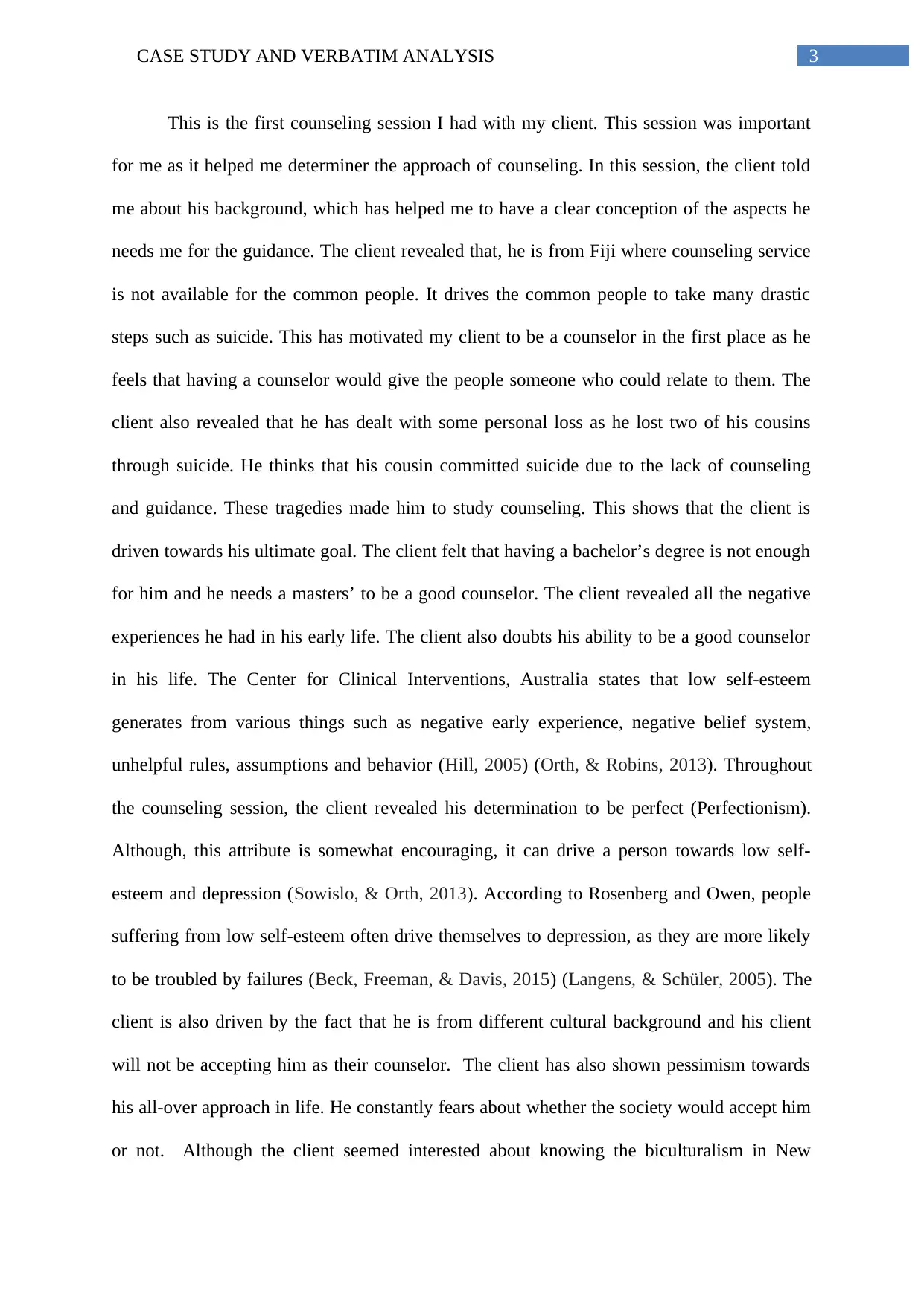
3CASE STUDY AND VERBATIM ANALYSIS
This is the first counseling session I had with my client. This session was important
for me as it helped me determiner the approach of counseling. In this session, the client told
me about his background, which has helped me to have a clear conception of the aspects he
needs me for the guidance. The client revealed that, he is from Fiji where counseling service
is not available for the common people. It drives the common people to take many drastic
steps such as suicide. This has motivated my client to be a counselor in the first place as he
feels that having a counselor would give the people someone who could relate to them. The
client also revealed that he has dealt with some personal loss as he lost two of his cousins
through suicide. He thinks that his cousin committed suicide due to the lack of counseling
and guidance. These tragedies made him to study counseling. This shows that the client is
driven towards his ultimate goal. The client felt that having a bachelor’s degree is not enough
for him and he needs a masters’ to be a good counselor. The client revealed all the negative
experiences he had in his early life. The client also doubts his ability to be a good counselor
in his life. The Center for Clinical Interventions, Australia states that low self-esteem
generates from various things such as negative early experience, negative belief system,
unhelpful rules, assumptions and behavior (Hill, 2005) (Orth, & Robins, 2013). Throughout
the counseling session, the client revealed his determination to be perfect (Perfectionism).
Although, this attribute is somewhat encouraging, it can drive a person towards low self-
esteem and depression (Sowislo, & Orth, 2013). According to Rosenberg and Owen, people
suffering from low self-esteem often drive themselves to depression, as they are more likely
to be troubled by failures (Beck, Freeman, & Davis, 2015) (Langens, & Schüler, 2005). The
client is also driven by the fact that he is from different cultural background and his client
will not be accepting him as their counselor. The client has also shown pessimism towards
his all-over approach in life. He constantly fears about whether the society would accept him
or not. Although the client seemed interested about knowing the biculturalism in New
This is the first counseling session I had with my client. This session was important
for me as it helped me determiner the approach of counseling. In this session, the client told
me about his background, which has helped me to have a clear conception of the aspects he
needs me for the guidance. The client revealed that, he is from Fiji where counseling service
is not available for the common people. It drives the common people to take many drastic
steps such as suicide. This has motivated my client to be a counselor in the first place as he
feels that having a counselor would give the people someone who could relate to them. The
client also revealed that he has dealt with some personal loss as he lost two of his cousins
through suicide. He thinks that his cousin committed suicide due to the lack of counseling
and guidance. These tragedies made him to study counseling. This shows that the client is
driven towards his ultimate goal. The client felt that having a bachelor’s degree is not enough
for him and he needs a masters’ to be a good counselor. The client revealed all the negative
experiences he had in his early life. The client also doubts his ability to be a good counselor
in his life. The Center for Clinical Interventions, Australia states that low self-esteem
generates from various things such as negative early experience, negative belief system,
unhelpful rules, assumptions and behavior (Hill, 2005) (Orth, & Robins, 2013). Throughout
the counseling session, the client revealed his determination to be perfect (Perfectionism).
Although, this attribute is somewhat encouraging, it can drive a person towards low self-
esteem and depression (Sowislo, & Orth, 2013). According to Rosenberg and Owen, people
suffering from low self-esteem often drive themselves to depression, as they are more likely
to be troubled by failures (Beck, Freeman, & Davis, 2015) (Langens, & Schüler, 2005). The
client is also driven by the fact that he is from different cultural background and his client
will not be accepting him as their counselor. The client has also shown pessimism towards
his all-over approach in life. He constantly fears about whether the society would accept him
or not. Although the client seemed interested about knowing the biculturalism in New
Paraphrase This Document
Need a fresh take? Get an instant paraphrase of this document with our AI Paraphraser
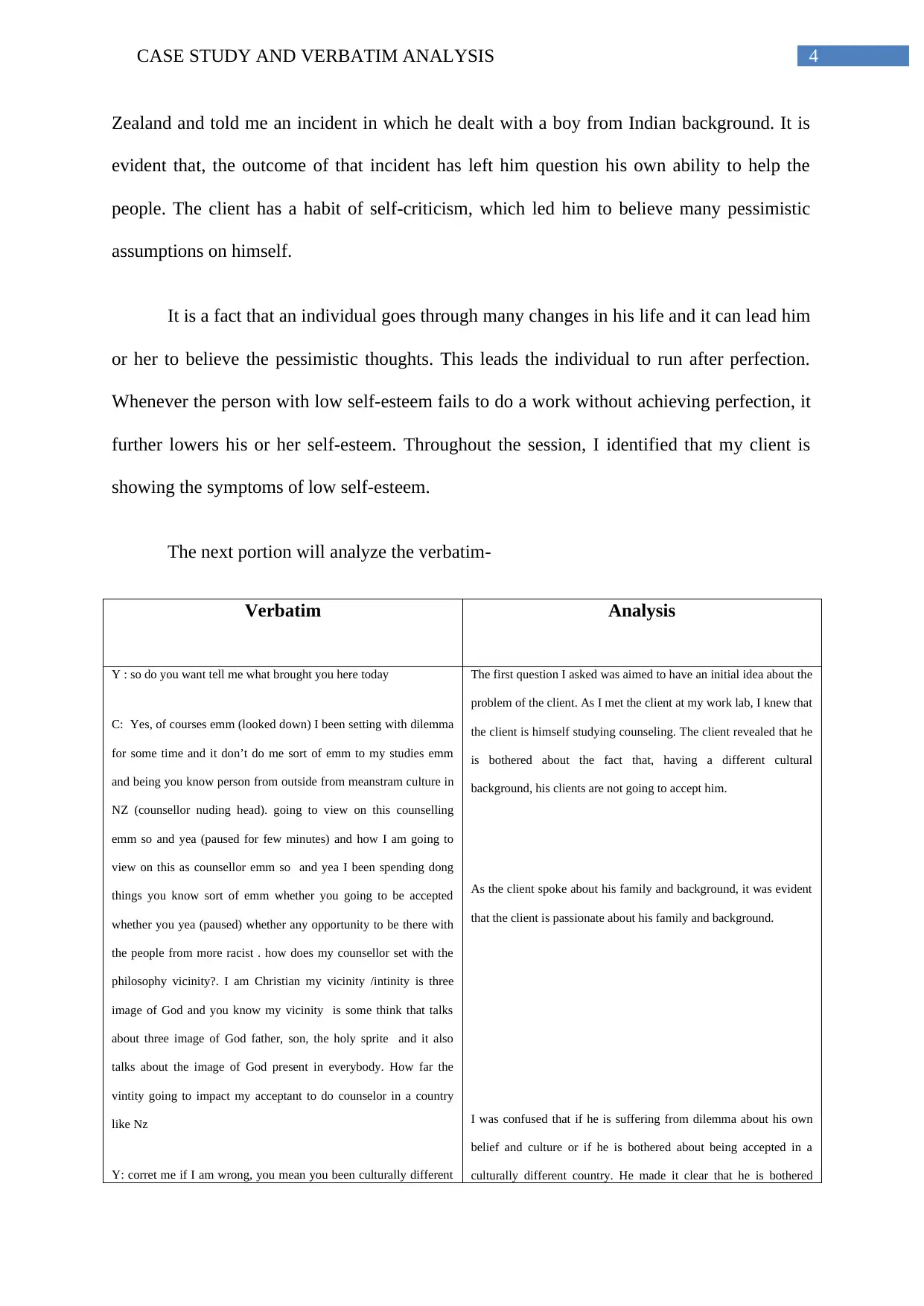
4CASE STUDY AND VERBATIM ANALYSIS
Zealand and told me an incident in which he dealt with a boy from Indian background. It is
evident that, the outcome of that incident has left him question his own ability to help the
people. The client has a habit of self-criticism, which led him to believe many pessimistic
assumptions on himself.
It is a fact that an individual goes through many changes in his life and it can lead him
or her to believe the pessimistic thoughts. This leads the individual to run after perfection.
Whenever the person with low self-esteem fails to do a work without achieving perfection, it
further lowers his or her self-esteem. Throughout the session, I identified that my client is
showing the symptoms of low self-esteem.
The next portion will analyze the verbatim-
Verbatim Analysis
Y : so do you want tell me what brought you here today
C: Yes, of courses emm (looked down) I been setting with dilemma
for some time and it don’t do me sort of emm to my studies emm
and being you know person from outside from meanstram culture in
NZ (counsellor nuding head). going to view on this counselling
emm so and yea (paused for few minutes) and how I am going to
view on this as counsellor emm so and yea I been spending dong
things you know sort of emm whether you going to be accepted
whether you yea (paused) whether any opportunity to be there with
the people from more racist . how does my counsellor set with the
philosophy vicinity?. I am Christian my vicinity /intinity is three
image of God and you know my vicinity is some think that talks
about three image of God father, son, the holy sprite and it also
talks about the image of God present in everybody. How far the
vintity going to impact my acceptant to do counselor in a country
like Nz
Y: corret me if I am wrong, you mean you been culturally different
The first question I asked was aimed to have an initial idea about the
problem of the client. As I met the client at my work lab, I knew that
the client is himself studying counseling. The client revealed that he
is bothered about the fact that, having a different cultural
background, his clients are not going to accept him.
As the client spoke about his family and background, it was evident
that the client is passionate about his family and background.
I was confused that if he is suffering from dilemma about his own
belief and culture or if he is bothered about being accepted in a
culturally different country. He made it clear that he is bothered
Zealand and told me an incident in which he dealt with a boy from Indian background. It is
evident that, the outcome of that incident has left him question his own ability to help the
people. The client has a habit of self-criticism, which led him to believe many pessimistic
assumptions on himself.
It is a fact that an individual goes through many changes in his life and it can lead him
or her to believe the pessimistic thoughts. This leads the individual to run after perfection.
Whenever the person with low self-esteem fails to do a work without achieving perfection, it
further lowers his or her self-esteem. Throughout the session, I identified that my client is
showing the symptoms of low self-esteem.
The next portion will analyze the verbatim-
Verbatim Analysis
Y : so do you want tell me what brought you here today
C: Yes, of courses emm (looked down) I been setting with dilemma
for some time and it don’t do me sort of emm to my studies emm
and being you know person from outside from meanstram culture in
NZ (counsellor nuding head). going to view on this counselling
emm so and yea (paused for few minutes) and how I am going to
view on this as counsellor emm so and yea I been spending dong
things you know sort of emm whether you going to be accepted
whether you yea (paused) whether any opportunity to be there with
the people from more racist . how does my counsellor set with the
philosophy vicinity?. I am Christian my vicinity /intinity is three
image of God and you know my vicinity is some think that talks
about three image of God father, son, the holy sprite and it also
talks about the image of God present in everybody. How far the
vintity going to impact my acceptant to do counselor in a country
like Nz
Y: corret me if I am wrong, you mean you been culturally different
The first question I asked was aimed to have an initial idea about the
problem of the client. As I met the client at my work lab, I knew that
the client is himself studying counseling. The client revealed that he
is bothered about the fact that, having a different cultural
background, his clients are not going to accept him.
As the client spoke about his family and background, it was evident
that the client is passionate about his family and background.
I was confused that if he is suffering from dilemma about his own
belief and culture or if he is bothered about being accepted in a
culturally different country. He made it clear that he is bothered
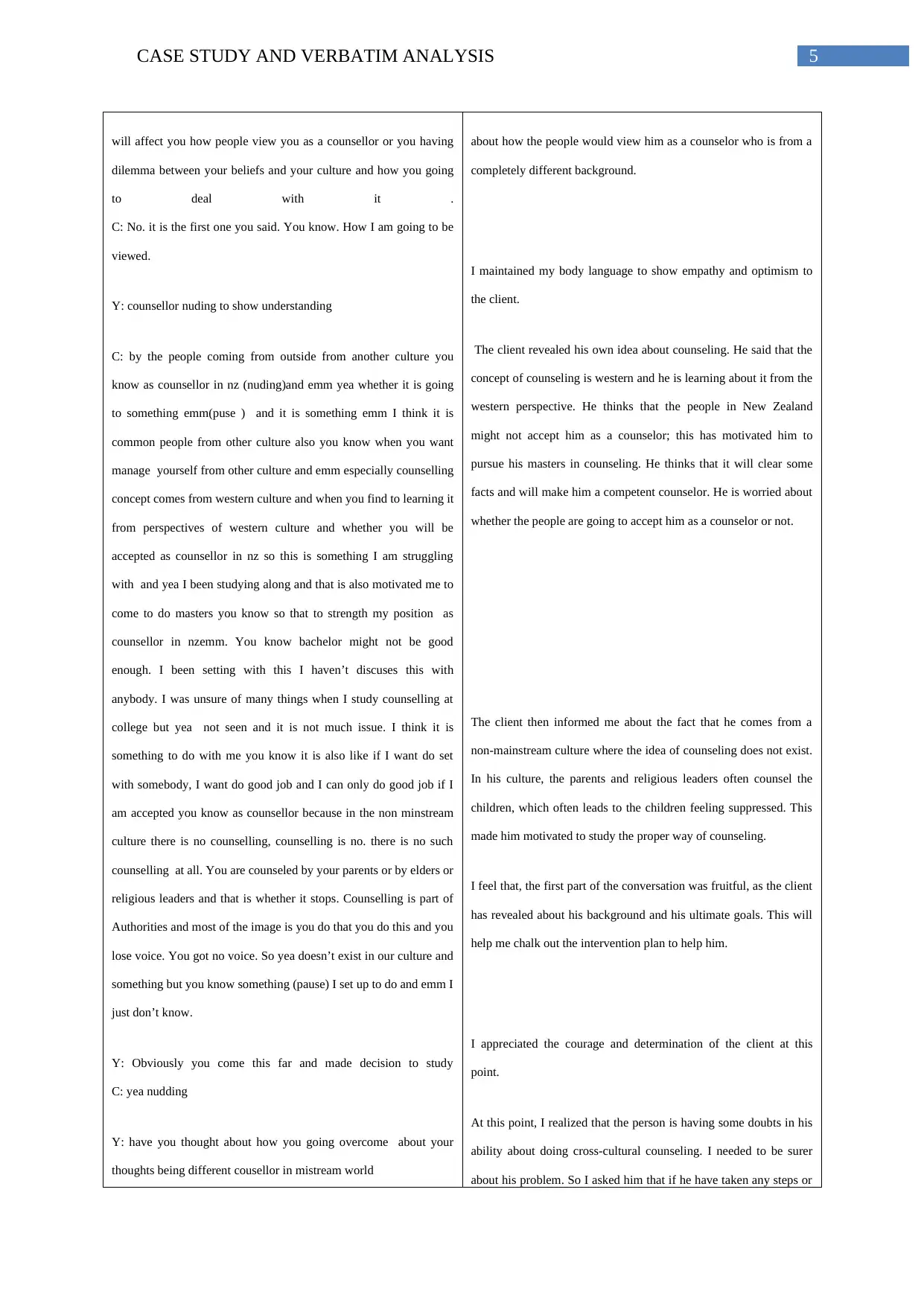
5CASE STUDY AND VERBATIM ANALYSIS
will affect you how people view you as a counsellor or you having
dilemma between your beliefs and your culture and how you going
to deal with it .
C: No. it is the first one you said. You know. How I am going to be
viewed.
Y: counsellor nuding to show understanding
C: by the people coming from outside from another culture you
know as counsellor in nz (nuding)and emm yea whether it is going
to something emm(puse ) and it is something emm I think it is
common people from other culture also you know when you want
manage yourself from other culture and emm especially counselling
concept comes from western culture and when you find to learning it
from perspectives of western culture and whether you will be
accepted as counsellor in nz so this is something I am struggling
with and yea I been studying along and that is also motivated me to
come to do masters you know so that to strength my position as
counsellor in nzemm. You know bachelor might not be good
enough. I been setting with this I haven’t discuses this with
anybody. I was unsure of many things when I study counselling at
college but yea not seen and it is not much issue. I think it is
something to do with me you know it is also like if I want do set
with somebody, I want do good job and I can only do good job if I
am accepted you know as counsellor because in the non minstream
culture there is no counselling, counselling is no. there is no such
counselling at all. You are counseled by your parents or by elders or
religious leaders and that is whether it stops. Counselling is part of
Authorities and most of the image is you do that you do this and you
lose voice. You got no voice. So yea doesn’t exist in our culture and
something but you know something (pause) I set up to do and emm I
just don’t know.
Y: Obviously you come this far and made decision to study
C: yea nudding
Y: have you thought about how you going overcome about your
thoughts being different cousellor in mistream world
about how the people would view him as a counselor who is from a
completely different background.
I maintained my body language to show empathy and optimism to
the client.
The client revealed his own idea about counseling. He said that the
concept of counseling is western and he is learning about it from the
western perspective. He thinks that the people in New Zealand
might not accept him as a counselor; this has motivated him to
pursue his masters in counseling. He thinks that it will clear some
facts and will make him a competent counselor. He is worried about
whether the people are going to accept him as a counselor or not.
The client then informed me about the fact that he comes from a
non-mainstream culture where the idea of counseling does not exist.
In his culture, the parents and religious leaders often counsel the
children, which often leads to the children feeling suppressed. This
made him motivated to study the proper way of counseling.
I feel that, the first part of the conversation was fruitful, as the client
has revealed about his background and his ultimate goals. This will
help me chalk out the intervention plan to help him.
I appreciated the courage and determination of the client at this
point.
At this point, I realized that the person is having some doubts in his
ability about doing cross-cultural counseling. I needed to be surer
about his problem. So I asked him that if he have taken any steps or
will affect you how people view you as a counsellor or you having
dilemma between your beliefs and your culture and how you going
to deal with it .
C: No. it is the first one you said. You know. How I am going to be
viewed.
Y: counsellor nuding to show understanding
C: by the people coming from outside from another culture you
know as counsellor in nz (nuding)and emm yea whether it is going
to something emm(puse ) and it is something emm I think it is
common people from other culture also you know when you want
manage yourself from other culture and emm especially counselling
concept comes from western culture and when you find to learning it
from perspectives of western culture and whether you will be
accepted as counsellor in nz so this is something I am struggling
with and yea I been studying along and that is also motivated me to
come to do masters you know so that to strength my position as
counsellor in nzemm. You know bachelor might not be good
enough. I been setting with this I haven’t discuses this with
anybody. I was unsure of many things when I study counselling at
college but yea not seen and it is not much issue. I think it is
something to do with me you know it is also like if I want do set
with somebody, I want do good job and I can only do good job if I
am accepted you know as counsellor because in the non minstream
culture there is no counselling, counselling is no. there is no such
counselling at all. You are counseled by your parents or by elders or
religious leaders and that is whether it stops. Counselling is part of
Authorities and most of the image is you do that you do this and you
lose voice. You got no voice. So yea doesn’t exist in our culture and
something but you know something (pause) I set up to do and emm I
just don’t know.
Y: Obviously you come this far and made decision to study
C: yea nudding
Y: have you thought about how you going overcome about your
thoughts being different cousellor in mistream world
about how the people would view him as a counselor who is from a
completely different background.
I maintained my body language to show empathy and optimism to
the client.
The client revealed his own idea about counseling. He said that the
concept of counseling is western and he is learning about it from the
western perspective. He thinks that the people in New Zealand
might not accept him as a counselor; this has motivated him to
pursue his masters in counseling. He thinks that it will clear some
facts and will make him a competent counselor. He is worried about
whether the people are going to accept him as a counselor or not.
The client then informed me about the fact that he comes from a
non-mainstream culture where the idea of counseling does not exist.
In his culture, the parents and religious leaders often counsel the
children, which often leads to the children feeling suppressed. This
made him motivated to study the proper way of counseling.
I feel that, the first part of the conversation was fruitful, as the client
has revealed about his background and his ultimate goals. This will
help me chalk out the intervention plan to help him.
I appreciated the courage and determination of the client at this
point.
At this point, I realized that the person is having some doubts in his
ability about doing cross-cultural counseling. I needed to be surer
about his problem. So I asked him that if he have taken any steps or
⊘ This is a preview!⊘
Do you want full access?
Subscribe today to unlock all pages.

Trusted by 1+ million students worldwide
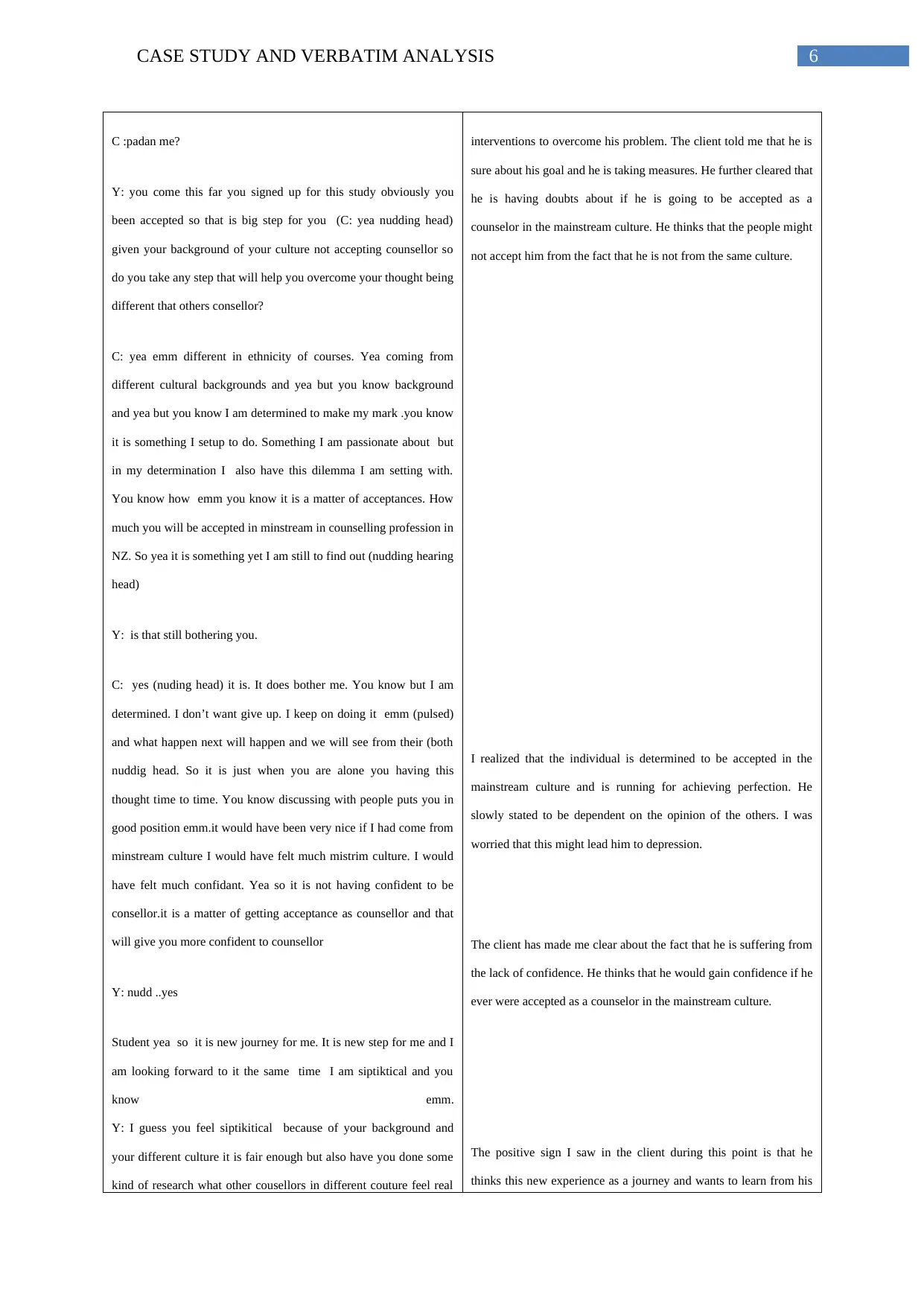
6CASE STUDY AND VERBATIM ANALYSIS
C :padan me?
Y: you come this far you signed up for this study obviously you
been accepted so that is big step for you (C: yea nudding head)
given your background of your culture not accepting counsellor so
do you take any step that will help you overcome your thought being
different that others consellor?
C: yea emm different in ethnicity of courses. Yea coming from
different cultural backgrounds and yea but you know background
and yea but you know I am determined to make my mark .you know
it is something I setup to do. Something I am passionate about but
in my determination I also have this dilemma I am setting with.
You know how emm you know it is a matter of acceptances. How
much you will be accepted in minstream in counselling profession in
NZ. So yea it is something yet I am still to find out (nudding hearing
head)
Y: is that still bothering you.
C: yes (nuding head) it is. It does bother me. You know but I am
determined. I don’t want give up. I keep on doing it emm (pulsed)
and what happen next will happen and we will see from their (both
nuddig head. So it is just when you are alone you having this
thought time to time. You know discussing with people puts you in
good position emm.it would have been very nice if I had come from
minstream culture I would have felt much mistrim culture. I would
have felt much confidant. Yea so it is not having confident to be
consellor.it is a matter of getting acceptance as counsellor and that
will give you more confident to counsellor
Y: nudd ..yes
Student yea so it is new journey for me. It is new step for me and I
am looking forward to it the same time I am siptiktical and you
know emm.
Y: I guess you feel siptikitical because of your background and
your different culture it is fair enough but also have you done some
kind of research what other cousellors in different couture feel real
interventions to overcome his problem. The client told me that he is
sure about his goal and he is taking measures. He further cleared that
he is having doubts about if he is going to be accepted as a
counselor in the mainstream culture. He thinks that the people might
not accept him from the fact that he is not from the same culture.
I realized that the individual is determined to be accepted in the
mainstream culture and is running for achieving perfection. He
slowly stated to be dependent on the opinion of the others. I was
worried that this might lead him to depression.
The client has made me clear about the fact that he is suffering from
the lack of confidence. He thinks that he would gain confidence if he
ever were accepted as a counselor in the mainstream culture.
The positive sign I saw in the client during this point is that he
thinks this new experience as a journey and wants to learn from his
C :padan me?
Y: you come this far you signed up for this study obviously you
been accepted so that is big step for you (C: yea nudding head)
given your background of your culture not accepting counsellor so
do you take any step that will help you overcome your thought being
different that others consellor?
C: yea emm different in ethnicity of courses. Yea coming from
different cultural backgrounds and yea but you know background
and yea but you know I am determined to make my mark .you know
it is something I setup to do. Something I am passionate about but
in my determination I also have this dilemma I am setting with.
You know how emm you know it is a matter of acceptances. How
much you will be accepted in minstream in counselling profession in
NZ. So yea it is something yet I am still to find out (nudding hearing
head)
Y: is that still bothering you.
C: yes (nuding head) it is. It does bother me. You know but I am
determined. I don’t want give up. I keep on doing it emm (pulsed)
and what happen next will happen and we will see from their (both
nuddig head. So it is just when you are alone you having this
thought time to time. You know discussing with people puts you in
good position emm.it would have been very nice if I had come from
minstream culture I would have felt much mistrim culture. I would
have felt much confidant. Yea so it is not having confident to be
consellor.it is a matter of getting acceptance as counsellor and that
will give you more confident to counsellor
Y: nudd ..yes
Student yea so it is new journey for me. It is new step for me and I
am looking forward to it the same time I am siptiktical and you
know emm.
Y: I guess you feel siptikitical because of your background and
your different culture it is fair enough but also have you done some
kind of research what other cousellors in different couture feel real
interventions to overcome his problem. The client told me that he is
sure about his goal and he is taking measures. He further cleared that
he is having doubts about if he is going to be accepted as a
counselor in the mainstream culture. He thinks that the people might
not accept him from the fact that he is not from the same culture.
I realized that the individual is determined to be accepted in the
mainstream culture and is running for achieving perfection. He
slowly stated to be dependent on the opinion of the others. I was
worried that this might lead him to depression.
The client has made me clear about the fact that he is suffering from
the lack of confidence. He thinks that he would gain confidence if he
ever were accepted as a counselor in the mainstream culture.
The positive sign I saw in the client during this point is that he
thinks this new experience as a journey and wants to learn from his
Paraphrase This Document
Need a fresh take? Get an instant paraphrase of this document with our AI Paraphraser
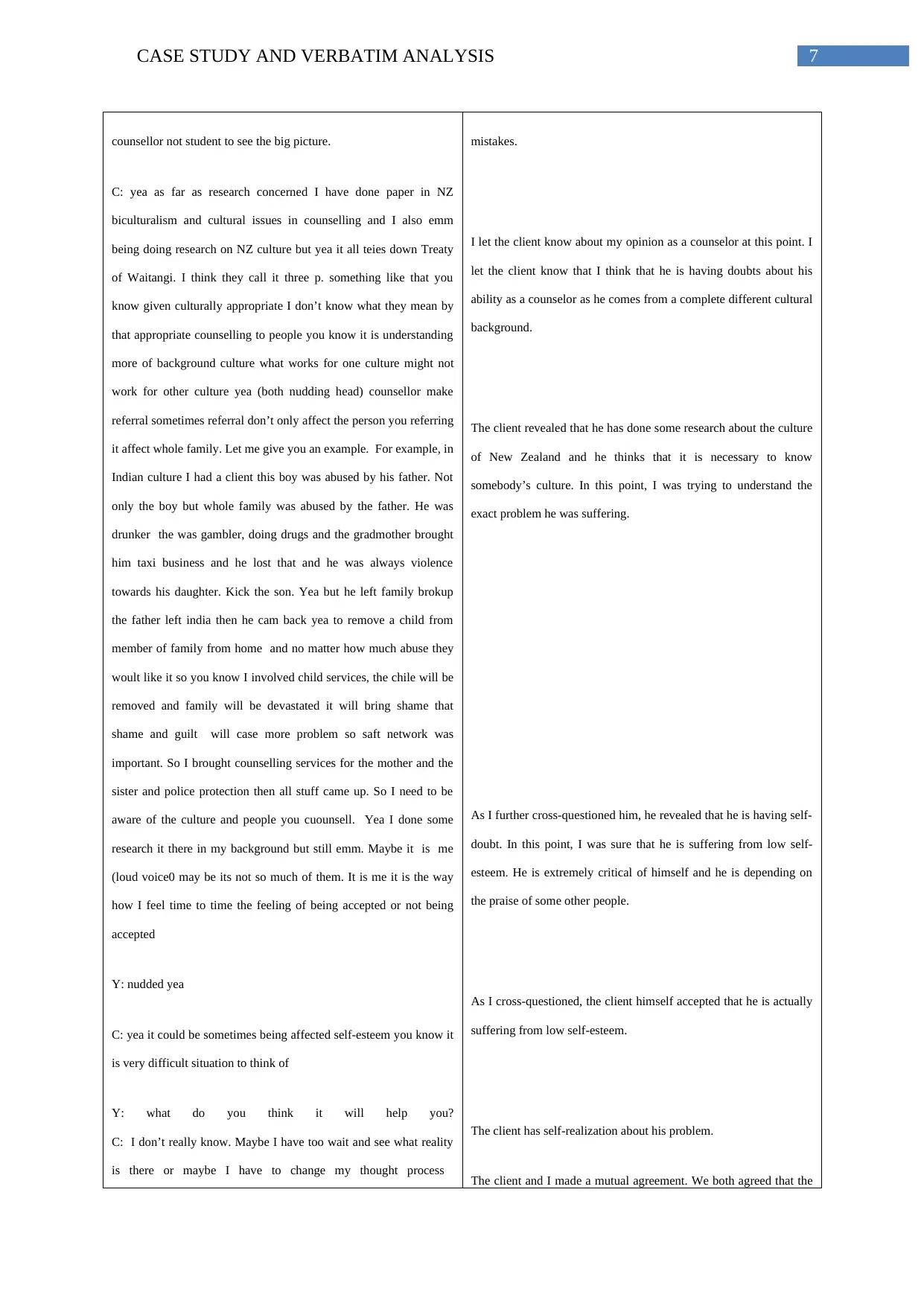
7CASE STUDY AND VERBATIM ANALYSIS
counsellor not student to see the big picture.
C: yea as far as research concerned I have done paper in NZ
biculturalism and cultural issues in counselling and I also emm
being doing research on NZ culture but yea it all teies down Treaty
of Waitangi. I think they call it three p. something like that you
know given culturally appropriate I don’t know what they mean by
that appropriate counselling to people you know it is understanding
more of background culture what works for one culture might not
work for other culture yea (both nudding head) counsellor make
referral sometimes referral don’t only affect the person you referring
it affect whole family. Let me give you an example. For example, in
Indian culture I had a client this boy was abused by his father. Not
only the boy but whole family was abused by the father. He was
drunker the was gambler, doing drugs and the gradmother brought
him taxi business and he lost that and he was always violence
towards his daughter. Kick the son. Yea but he left family brokup
the father left india then he cam back yea to remove a child from
member of family from home and no matter how much abuse they
woult like it so you know I involved child services, the chile will be
removed and family will be devastated it will bring shame that
shame and guilt will case more problem so saft network was
important. So I brought counselling services for the mother and the
sister and police protection then all stuff came up. So I need to be
aware of the culture and people you cuounsell. Yea I done some
research it there in my background but still emm. Maybe it is me
(loud voice0 may be its not so much of them. It is me it is the way
how I feel time to time the feeling of being accepted or not being
accepted
Y: nudded yea
C: yea it could be sometimes being affected self-esteem you know it
is very difficult situation to think of
Y: what do you think it will help you?
C: I don’t really know. Maybe I have too wait and see what reality
is there or maybe I have to change my thought process
mistakes.
I let the client know about my opinion as a counselor at this point. I
let the client know that I think that he is having doubts about his
ability as a counselor as he comes from a complete different cultural
background.
The client revealed that he has done some research about the culture
of New Zealand and he thinks that it is necessary to know
somebody’s culture. In this point, I was trying to understand the
exact problem he was suffering.
As I further cross-questioned him, he revealed that he is having self-
doubt. In this point, I was sure that he is suffering from low self-
esteem. He is extremely critical of himself and he is depending on
the praise of some other people.
As I cross-questioned, the client himself accepted that he is actually
suffering from low self-esteem.
The client has self-realization about his problem.
The client and I made a mutual agreement. We both agreed that the
counsellor not student to see the big picture.
C: yea as far as research concerned I have done paper in NZ
biculturalism and cultural issues in counselling and I also emm
being doing research on NZ culture but yea it all teies down Treaty
of Waitangi. I think they call it three p. something like that you
know given culturally appropriate I don’t know what they mean by
that appropriate counselling to people you know it is understanding
more of background culture what works for one culture might not
work for other culture yea (both nudding head) counsellor make
referral sometimes referral don’t only affect the person you referring
it affect whole family. Let me give you an example. For example, in
Indian culture I had a client this boy was abused by his father. Not
only the boy but whole family was abused by the father. He was
drunker the was gambler, doing drugs and the gradmother brought
him taxi business and he lost that and he was always violence
towards his daughter. Kick the son. Yea but he left family brokup
the father left india then he cam back yea to remove a child from
member of family from home and no matter how much abuse they
woult like it so you know I involved child services, the chile will be
removed and family will be devastated it will bring shame that
shame and guilt will case more problem so saft network was
important. So I brought counselling services for the mother and the
sister and police protection then all stuff came up. So I need to be
aware of the culture and people you cuounsell. Yea I done some
research it there in my background but still emm. Maybe it is me
(loud voice0 may be its not so much of them. It is me it is the way
how I feel time to time the feeling of being accepted or not being
accepted
Y: nudded yea
C: yea it could be sometimes being affected self-esteem you know it
is very difficult situation to think of
Y: what do you think it will help you?
C: I don’t really know. Maybe I have too wait and see what reality
is there or maybe I have to change my thought process
mistakes.
I let the client know about my opinion as a counselor at this point. I
let the client know that I think that he is having doubts about his
ability as a counselor as he comes from a complete different cultural
background.
The client revealed that he has done some research about the culture
of New Zealand and he thinks that it is necessary to know
somebody’s culture. In this point, I was trying to understand the
exact problem he was suffering.
As I further cross-questioned him, he revealed that he is having self-
doubt. In this point, I was sure that he is suffering from low self-
esteem. He is extremely critical of himself and he is depending on
the praise of some other people.
As I cross-questioned, the client himself accepted that he is actually
suffering from low self-esteem.
The client has self-realization about his problem.
The client and I made a mutual agreement. We both agreed that the
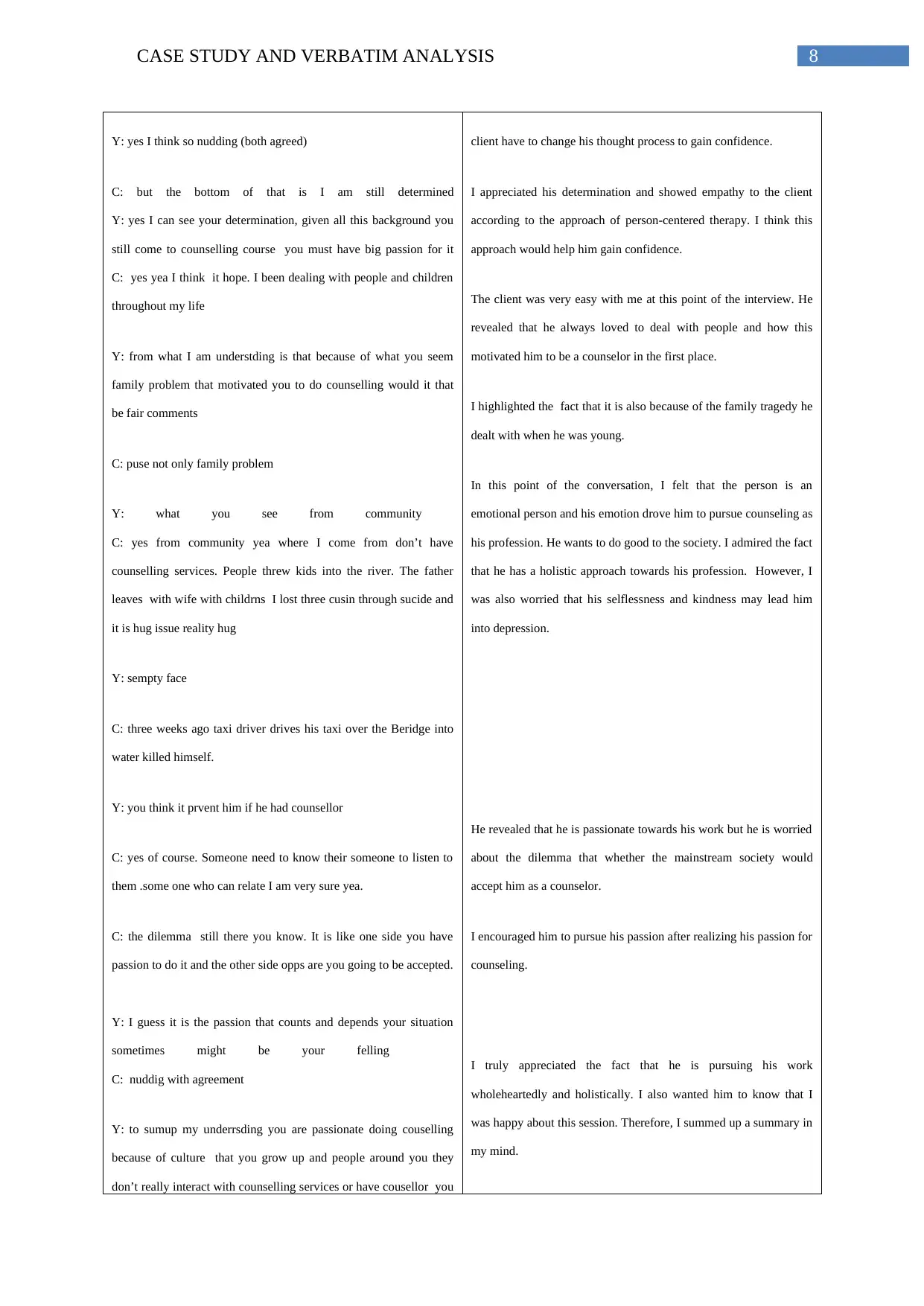
8CASE STUDY AND VERBATIM ANALYSIS
Y: yes I think so nudding (both agreed)
C: but the bottom of that is I am still determined
Y: yes I can see your determination, given all this background you
still come to counselling course you must have big passion for it
C: yes yea I think it hope. I been dealing with people and children
throughout my life
Y: from what I am understding is that because of what you seem
family problem that motivated you to do counselling would it that
be fair comments
C: puse not only family problem
Y: what you see from community
C: yes from community yea where I come from don’t have
counselling services. People threw kids into the river. The father
leaves with wife with childrns I lost three cusin through sucide and
it is hug issue reality hug
Y: sempty face
C: three weeks ago taxi driver drives his taxi over the Beridge into
water killed himself.
Y: you think it prvent him if he had counsellor
C: yes of course. Someone need to know their someone to listen to
them .some one who can relate I am very sure yea.
C: the dilemma still there you know. It is like one side you have
passion to do it and the other side opps are you going to be accepted.
Y: I guess it is the passion that counts and depends your situation
sometimes might be your felling
C: nuddig with agreement
Y: to sumup my underrsding you are passionate doing couselling
because of culture that you grow up and people around you they
don’t really interact with counselling services or have cousellor you
client have to change his thought process to gain confidence.
I appreciated his determination and showed empathy to the client
according to the approach of person-centered therapy. I think this
approach would help him gain confidence.
The client was very easy with me at this point of the interview. He
revealed that he always loved to deal with people and how this
motivated him to be a counselor in the first place.
I highlighted the fact that it is also because of the family tragedy he
dealt with when he was young.
In this point of the conversation, I felt that the person is an
emotional person and his emotion drove him to pursue counseling as
his profession. He wants to do good to the society. I admired the fact
that he has a holistic approach towards his profession. However, I
was also worried that his selflessness and kindness may lead him
into depression.
He revealed that he is passionate towards his work but he is worried
about the dilemma that whether the mainstream society would
accept him as a counselor.
I encouraged him to pursue his passion after realizing his passion for
counseling.
I truly appreciated the fact that he is pursuing his work
wholeheartedly and holistically. I also wanted him to know that I
was happy about this session. Therefore, I summed up a summary in
my mind.
Y: yes I think so nudding (both agreed)
C: but the bottom of that is I am still determined
Y: yes I can see your determination, given all this background you
still come to counselling course you must have big passion for it
C: yes yea I think it hope. I been dealing with people and children
throughout my life
Y: from what I am understding is that because of what you seem
family problem that motivated you to do counselling would it that
be fair comments
C: puse not only family problem
Y: what you see from community
C: yes from community yea where I come from don’t have
counselling services. People threw kids into the river. The father
leaves with wife with childrns I lost three cusin through sucide and
it is hug issue reality hug
Y: sempty face
C: three weeks ago taxi driver drives his taxi over the Beridge into
water killed himself.
Y: you think it prvent him if he had counsellor
C: yes of course. Someone need to know their someone to listen to
them .some one who can relate I am very sure yea.
C: the dilemma still there you know. It is like one side you have
passion to do it and the other side opps are you going to be accepted.
Y: I guess it is the passion that counts and depends your situation
sometimes might be your felling
C: nuddig with agreement
Y: to sumup my underrsding you are passionate doing couselling
because of culture that you grow up and people around you they
don’t really interact with counselling services or have cousellor you
client have to change his thought process to gain confidence.
I appreciated his determination and showed empathy to the client
according to the approach of person-centered therapy. I think this
approach would help him gain confidence.
The client was very easy with me at this point of the interview. He
revealed that he always loved to deal with people and how this
motivated him to be a counselor in the first place.
I highlighted the fact that it is also because of the family tragedy he
dealt with when he was young.
In this point of the conversation, I felt that the person is an
emotional person and his emotion drove him to pursue counseling as
his profession. He wants to do good to the society. I admired the fact
that he has a holistic approach towards his profession. However, I
was also worried that his selflessness and kindness may lead him
into depression.
He revealed that he is passionate towards his work but he is worried
about the dilemma that whether the mainstream society would
accept him as a counselor.
I encouraged him to pursue his passion after realizing his passion for
counseling.
I truly appreciated the fact that he is pursuing his work
wholeheartedly and holistically. I also wanted him to know that I
was happy about this session. Therefore, I summed up a summary in
my mind.
⊘ This is a preview!⊘
Do you want full access?
Subscribe today to unlock all pages.

Trusted by 1+ million students worldwide
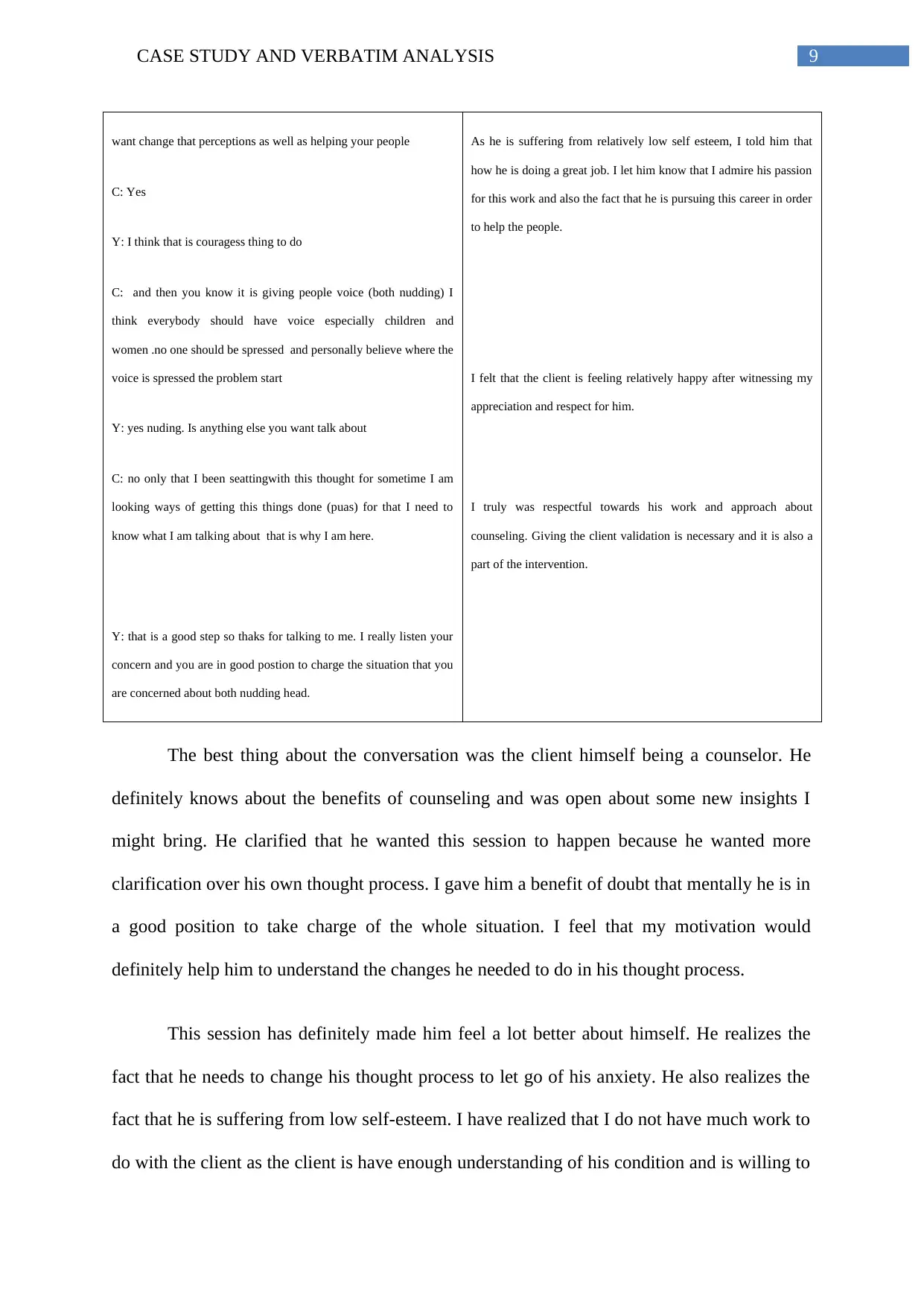
9CASE STUDY AND VERBATIM ANALYSIS
want change that perceptions as well as helping your people
C: Yes
Y: I think that is couragess thing to do
C: and then you know it is giving people voice (both nudding) I
think everybody should have voice especially children and
women .no one should be spressed and personally believe where the
voice is spressed the problem start
Y: yes nuding. Is anything else you want talk about
C: no only that I been seattingwith this thought for sometime I am
looking ways of getting this things done (puas) for that I need to
know what I am talking about that is why I am here.
Y: that is a good step so thaks for talking to me. I really listen your
concern and you are in good postion to charge the situation that you
are concerned about both nudding head.
As he is suffering from relatively low self esteem, I told him that
how he is doing a great job. I let him know that I admire his passion
for this work and also the fact that he is pursuing this career in order
to help the people.
I felt that the client is feeling relatively happy after witnessing my
appreciation and respect for him.
I truly was respectful towards his work and approach about
counseling. Giving the client validation is necessary and it is also a
part of the intervention.
The best thing about the conversation was the client himself being a counselor. He
definitely knows about the benefits of counseling and was open about some new insights I
might bring. He clarified that he wanted this session to happen because he wanted more
clarification over his own thought process. I gave him a benefit of doubt that mentally he is in
a good position to take charge of the whole situation. I feel that my motivation would
definitely help him to understand the changes he needed to do in his thought process.
This session has definitely made him feel a lot better about himself. He realizes the
fact that he needs to change his thought process to let go of his anxiety. He also realizes the
fact that he is suffering from low self-esteem. I have realized that I do not have much work to
do with the client as the client is have enough understanding of his condition and is willing to
want change that perceptions as well as helping your people
C: Yes
Y: I think that is couragess thing to do
C: and then you know it is giving people voice (both nudding) I
think everybody should have voice especially children and
women .no one should be spressed and personally believe where the
voice is spressed the problem start
Y: yes nuding. Is anything else you want talk about
C: no only that I been seattingwith this thought for sometime I am
looking ways of getting this things done (puas) for that I need to
know what I am talking about that is why I am here.
Y: that is a good step so thaks for talking to me. I really listen your
concern and you are in good postion to charge the situation that you
are concerned about both nudding head.
As he is suffering from relatively low self esteem, I told him that
how he is doing a great job. I let him know that I admire his passion
for this work and also the fact that he is pursuing this career in order
to help the people.
I felt that the client is feeling relatively happy after witnessing my
appreciation and respect for him.
I truly was respectful towards his work and approach about
counseling. Giving the client validation is necessary and it is also a
part of the intervention.
The best thing about the conversation was the client himself being a counselor. He
definitely knows about the benefits of counseling and was open about some new insights I
might bring. He clarified that he wanted this session to happen because he wanted more
clarification over his own thought process. I gave him a benefit of doubt that mentally he is in
a good position to take charge of the whole situation. I feel that my motivation would
definitely help him to understand the changes he needed to do in his thought process.
This session has definitely made him feel a lot better about himself. He realizes the
fact that he needs to change his thought process to let go of his anxiety. He also realizes the
fact that he is suffering from low self-esteem. I have realized that I do not have much work to
do with the client as the client is have enough understanding of his condition and is willing to
Paraphrase This Document
Need a fresh take? Get an instant paraphrase of this document with our AI Paraphraser
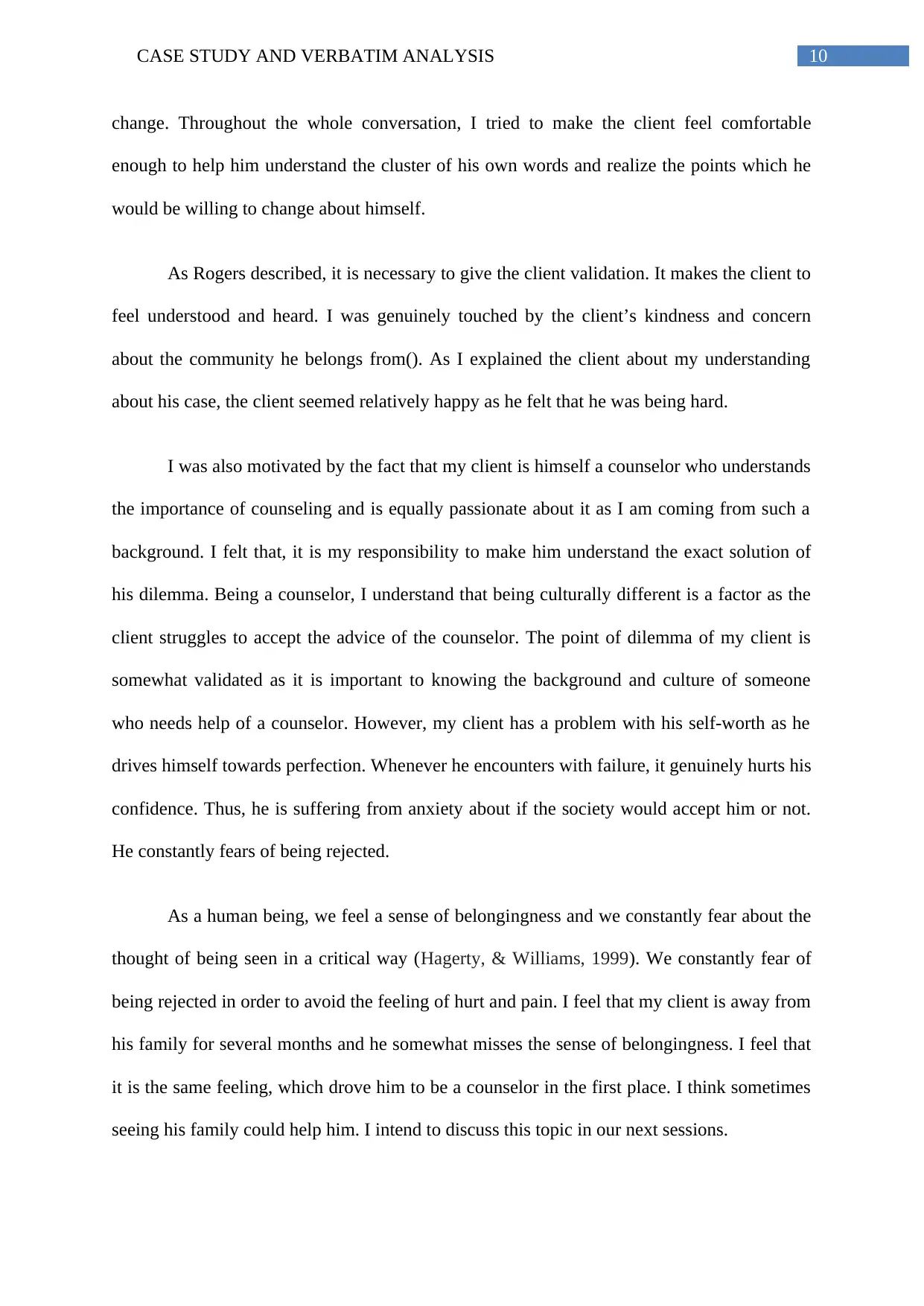
10CASE STUDY AND VERBATIM ANALYSIS
change. Throughout the whole conversation, I tried to make the client feel comfortable
enough to help him understand the cluster of his own words and realize the points which he
would be willing to change about himself.
As Rogers described, it is necessary to give the client validation. It makes the client to
feel understood and heard. I was genuinely touched by the client’s kindness and concern
about the community he belongs from(). As I explained the client about my understanding
about his case, the client seemed relatively happy as he felt that he was being hard.
I was also motivated by the fact that my client is himself a counselor who understands
the importance of counseling and is equally passionate about it as I am coming from such a
background. I felt that, it is my responsibility to make him understand the exact solution of
his dilemma. Being a counselor, I understand that being culturally different is a factor as the
client struggles to accept the advice of the counselor. The point of dilemma of my client is
somewhat validated as it is important to knowing the background and culture of someone
who needs help of a counselor. However, my client has a problem with his self-worth as he
drives himself towards perfection. Whenever he encounters with failure, it genuinely hurts his
confidence. Thus, he is suffering from anxiety about if the society would accept him or not.
He constantly fears of being rejected.
As a human being, we feel a sense of belongingness and we constantly fear about the
thought of being seen in a critical way (Hagerty, & Williams, 1999). We constantly fear of
being rejected in order to avoid the feeling of hurt and pain. I feel that my client is away from
his family for several months and he somewhat misses the sense of belongingness. I feel that
it is the same feeling, which drove him to be a counselor in the first place. I think sometimes
seeing his family could help him. I intend to discuss this topic in our next sessions.
change. Throughout the whole conversation, I tried to make the client feel comfortable
enough to help him understand the cluster of his own words and realize the points which he
would be willing to change about himself.
As Rogers described, it is necessary to give the client validation. It makes the client to
feel understood and heard. I was genuinely touched by the client’s kindness and concern
about the community he belongs from(). As I explained the client about my understanding
about his case, the client seemed relatively happy as he felt that he was being hard.
I was also motivated by the fact that my client is himself a counselor who understands
the importance of counseling and is equally passionate about it as I am coming from such a
background. I felt that, it is my responsibility to make him understand the exact solution of
his dilemma. Being a counselor, I understand that being culturally different is a factor as the
client struggles to accept the advice of the counselor. The point of dilemma of my client is
somewhat validated as it is important to knowing the background and culture of someone
who needs help of a counselor. However, my client has a problem with his self-worth as he
drives himself towards perfection. Whenever he encounters with failure, it genuinely hurts his
confidence. Thus, he is suffering from anxiety about if the society would accept him or not.
He constantly fears of being rejected.
As a human being, we feel a sense of belongingness and we constantly fear about the
thought of being seen in a critical way (Hagerty, & Williams, 1999). We constantly fear of
being rejected in order to avoid the feeling of hurt and pain. I feel that my client is away from
his family for several months and he somewhat misses the sense of belongingness. I feel that
it is the same feeling, which drove him to be a counselor in the first place. I think sometimes
seeing his family could help him. I intend to discuss this topic in our next sessions.
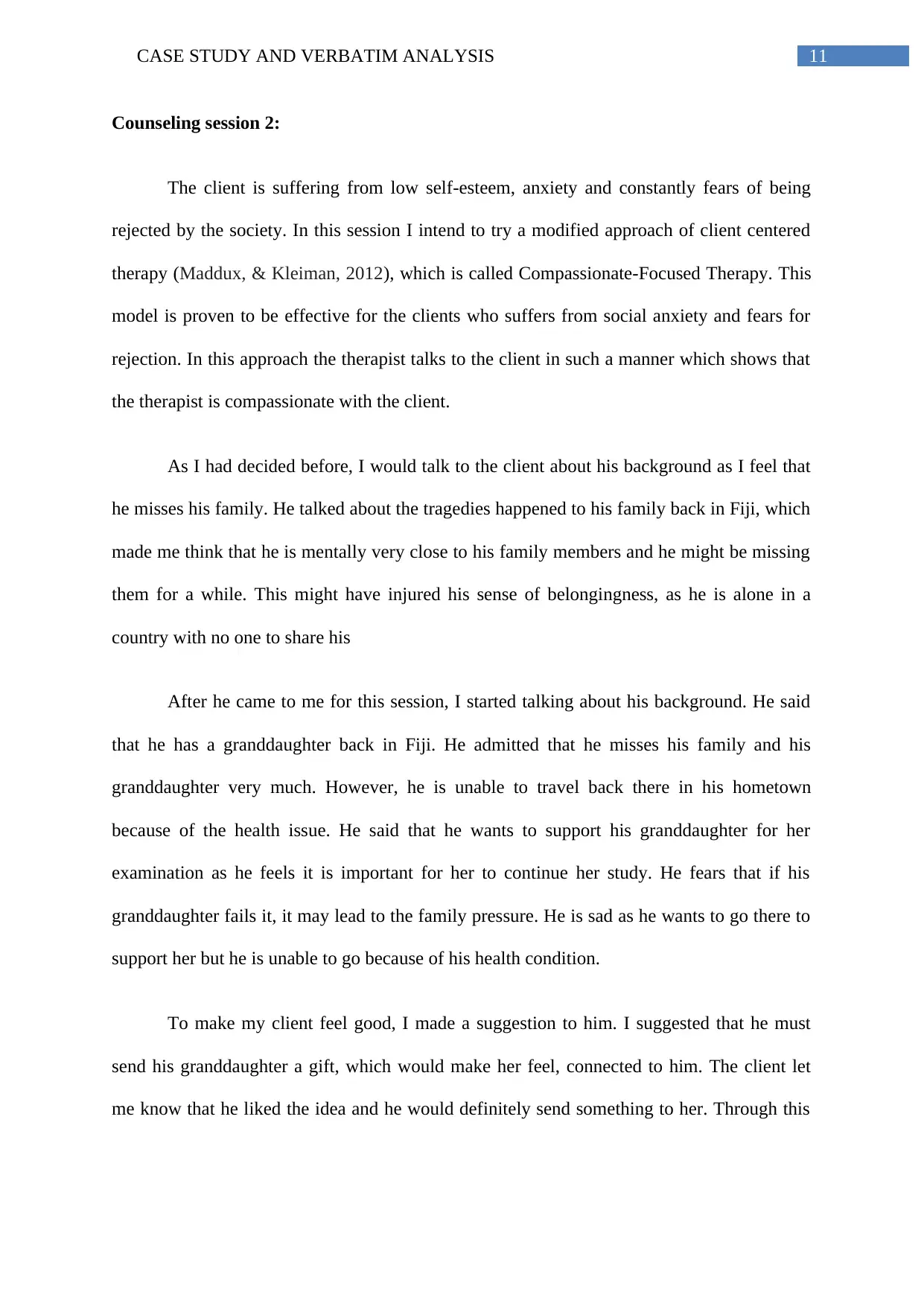
11CASE STUDY AND VERBATIM ANALYSIS
Counseling session 2:
The client is suffering from low self-esteem, anxiety and constantly fears of being
rejected by the society. In this session I intend to try a modified approach of client centered
therapy (Maddux, & Kleiman, 2012), which is called Compassionate-Focused Therapy. This
model is proven to be effective for the clients who suffers from social anxiety and fears for
rejection. In this approach the therapist talks to the client in such a manner which shows that
the therapist is compassionate with the client.
As I had decided before, I would talk to the client about his background as I feel that
he misses his family. He talked about the tragedies happened to his family back in Fiji, which
made me think that he is mentally very close to his family members and he might be missing
them for a while. This might have injured his sense of belongingness, as he is alone in a
country with no one to share his
After he came to me for this session, I started talking about his background. He said
that he has a granddaughter back in Fiji. He admitted that he misses his family and his
granddaughter very much. However, he is unable to travel back there in his hometown
because of the health issue. He said that he wants to support his granddaughter for her
examination as he feels it is important for her to continue her study. He fears that if his
granddaughter fails it, it may lead to the family pressure. He is sad as he wants to go there to
support her but he is unable to go because of his health condition.
To make my client feel good, I made a suggestion to him. I suggested that he must
send his granddaughter a gift, which would make her feel, connected to him. The client let
me know that he liked the idea and he would definitely send something to her. Through this
Counseling session 2:
The client is suffering from low self-esteem, anxiety and constantly fears of being
rejected by the society. In this session I intend to try a modified approach of client centered
therapy (Maddux, & Kleiman, 2012), which is called Compassionate-Focused Therapy. This
model is proven to be effective for the clients who suffers from social anxiety and fears for
rejection. In this approach the therapist talks to the client in such a manner which shows that
the therapist is compassionate with the client.
As I had decided before, I would talk to the client about his background as I feel that
he misses his family. He talked about the tragedies happened to his family back in Fiji, which
made me think that he is mentally very close to his family members and he might be missing
them for a while. This might have injured his sense of belongingness, as he is alone in a
country with no one to share his
After he came to me for this session, I started talking about his background. He said
that he has a granddaughter back in Fiji. He admitted that he misses his family and his
granddaughter very much. However, he is unable to travel back there in his hometown
because of the health issue. He said that he wants to support his granddaughter for her
examination as he feels it is important for her to continue her study. He fears that if his
granddaughter fails it, it may lead to the family pressure. He is sad as he wants to go there to
support her but he is unable to go because of his health condition.
To make my client feel good, I made a suggestion to him. I suggested that he must
send his granddaughter a gift, which would make her feel, connected to him. The client let
me know that he liked the idea and he would definitely send something to her. Through this
⊘ This is a preview!⊘
Do you want full access?
Subscribe today to unlock all pages.

Trusted by 1+ million students worldwide
1 out of 16
Related Documents
Your All-in-One AI-Powered Toolkit for Academic Success.
+13062052269
info@desklib.com
Available 24*7 on WhatsApp / Email
![[object Object]](/_next/static/media/star-bottom.7253800d.svg)
Unlock your academic potential
Copyright © 2020–2026 A2Z Services. All Rights Reserved. Developed and managed by ZUCOL.





